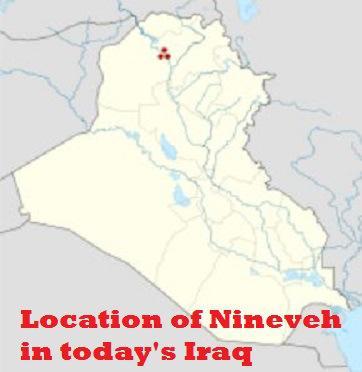Jonah 3:1-5, 10
The word of the LORD came to Jonah, saying:
“Set out for the great city of Nineveh,
and announce to it the message that I will tell you.”
So Jonah made ready and went to Nineveh,
according to the LORD’S bidding.
Now Nineveh was an enormously large city;
it took three days to go through it.
Jonah began his journey through the city,
and had gone but a single day’s walk announcing,
“Forty days more and Nineveh shall be destroyed, “
when the people of Nineveh believed God;
they proclaimed a fast
and all of them, great and small, put on sackcloth.
When God saw by their actions how they turned from their evil way,
he repented of the evil that he had threatened to do to them;
he did not carry it out.
Nineveh is an ancient Mesopotamian city on the eastern bank of the Tigris River. It was the capital of the short-lived Assyrian Empire (911 BC-609 BC) and the largest city in the world for some 50 years.
The Book of Jonah, set in the days of the Assyrian empire, describes it as an “exceedingly great city of three days journey in breadth” with a population of “more than 120,000,” but a wicked city worthy of destruction. God sent Jonah to preach to the Ninevites of their coming destruction, and they fasted and repented. As a result, God spared the city; when Jonah protests against this, God states He is showing mercy for the population who are ignorant of the difference between right and wrong (“who cannot discern between their right hand and their left hand”) and the animals in the city. Nineveh’s repentance and salvation from evil is also noted in the Gospel of Matthew (12:41) and the Gospel of Luke (11:32).
The book of the prophet Nahum is almost exclusively taken up with prophetic denunciations against this city, foretelling its eventual ruin and utter desolation (Nahum 1:14; 3:19; 2:6–11). Its end was strange, sudden, tragic. In 612 BC, after a bitter period of civil war in Assyria, Nineveh was sacked by a coalition of former subject peoples — the Babylonians, Medes, Persians, Chaldeans, Scythians and Cimmerians.
In fulfillment of prophecy, God made “an utter end of the place” — it became a “desolation.” Today, the ruins of Nineveh are across the river from the city of Mosul, in Iraq.

See also “Archeologists find evidence of the obliteration of Sodom-Gomorrah”.
~Éowyn

